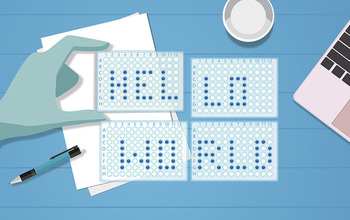Meet 'Coscientist,' your AI lab partner

An artist's conceptual representation of chemistry research conducted by AI.
January 5, 2024
An AI-based system succeeds in planning and carrying out real-world chemistry experiments, showing the potential to help human scientists make more discoveries, faster.
In less time than it will take you to read this article, an artificial intelligence-driven system was able to autonomously learn about certain Nobel Prize-winning chemical reactions and design a successful laboratory procedure to make them. The AI did all that in just a few minutes — and nailed it on the first try.
"This is the first time that a non-organic intelligence planned, designed and executed this complex reaction that was invented by humans," says Carnegie Mellon University chemist and chemical engineer Gabe Gomes, who led the research team that assembled and tested the AI-based system. They dubbed their creation "Coscientist."
The most complex reactions Coscientist pulled off are known in organic chemistry as palladium-catalyzed cross couplings, which earned its human inventors the 2010 Nobel Prize for chemistry in recognition of the outsize role those reactions came to play in the pharmaceutical development process and other industries that use finicky, carbon-based molecules.
Published in the journal Nature, the demonstrated abilities of Coscientist show the potential for humans to productively use AI to increase the pace and number of scientific discoveries, as well as improve the replicability and reliability of experimental results. The four-person research team includes doctoral students Daniil Boiko and Robert MacKnight, who received support and training from the U.S. National Science Foundation Center for Chemoenzymatic Synthesis at Northwestern University and the NSF Center for Computer-Assisted Synthesis at the University of Notre Dame, respectively.
The U.S. National Science Foundation propels the nation forward by advancing fundamental research in all fields of science and engineering. NSF supports research and people by providing facilities, instruments and funding to support their ingenuity and sustain the U.S. as a global leader in research and innovation. With a fiscal year 2023 budget of $9.5 billion, NSF funds reach all 50 states through grants to nearly 2,000 colleges, universities and institutions. Each year, NSF receives more than 40,000 competitive proposals and makes about 11,000 new awards. Those awards include support for cooperative research with industry, Arctic and Antarctic research and operations, and U.S. participation in international scientific efforts.
Connect with us online
NSF website: nsf.gov
NSF News: nsf.gov/news
For News Media: nsf.gov/news/newsroom
Statistics: nsf.gov/statistics/
Awards database: nsf.gov/awardsearch/
Follow us on social
Twitter: twitter.com/NSF
Facebook: facebook.com/US.NSF
Instagram: instagram.com/nsfgov


